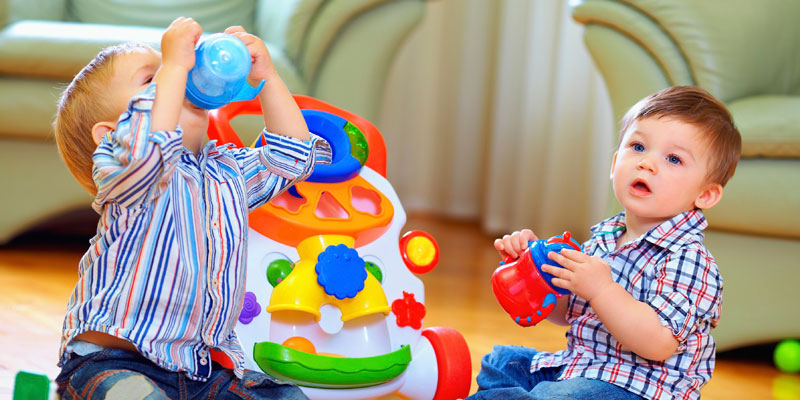
Teaching Manners: 3 Ways to Help Your Baby Build Positive Social Behaviors
Since our children are watching and learning from us right from the start, it’s never too early to start teaching manners. At 9-12 months old, your baby is developing enough Self-Control to be able to use some of the polite behaviors he sees you doing, such as placing a napkin on his lap at mealtime or picking up a paper someone else has dropped. He will start picking up your habits and polite phrases, if he sees and hears you using them often!1 And it will be much easier to convince him of the importance of good manners if you show him that they are something that you value.
(SPECIAL OFFER: Sign up for Playful Bee’s Bee Well developmental learning program to give your baby the best start in life. The first 10,000 children enroll for FREE! Sign up today.)
As your baby gets older, you can take a more active role in teaching manners. For example, if he needs to get past someone, teach him to tap their arm (and later on, say “excuse me”) instead of just pushing past. As he starts to talk, encourage him to say “please” and “thank you” to both you and others. He may not really understand what these words mean, except that “please” is something you say when you want something and “thank you” is what you say when you get it,2 but the seeds of polite behavior will be planted!
Point out when you see someone acting in a polite or impolite manner. Talk to your baby about his behavior too, but try to focus on the positive.1 When he uses good manners, let him know that you noticed and are proud of his friendly behavior (e.g. “You gave Grandma such a friendly greeting!” or “That was so nice of you to share your toy with your friend!”). If you do need to correct him, do it politely,2 which again models good behavior and calmly reminds him of the appropriate behavior you are expecting.
Playing with other kids is also beneficial to learning manners. With caregivers there to referee and point out good and bad behaviors, playing with other young children will teach your baby how to share toys, take turns, and communicate with playmates.3 In addition, being able to watch other children will help him understand how to act in a socially acceptable way, which he will master as he grows and starts to play more interactively. Older siblings can also set an example of Cooperation and good Self-Control.4 Sometimes just watching an older sibling make good choices and demonstrate positive behaviors is enough to get a 9- to 12-month-old to jump on board!
Play Tips:
Do you want to know how you can support your baby’s development of these Self-Control and Following Rules and Routines skills at this age? It’s easy! Read on for some simple tips to incorporate into your daily play time together.
- Model polite behaviors right now, if you haven’t started to already!1,2 Your baby is observing you from the very start, so it is never too early to start modeling good manners. If you always make a habit of saying “please” and “thank you,” it will be more likely to become one of his habits as well. If you always place a napkin on your lap at dinnertime, your baby will follow your example.
- Set clear and firm boundaries on how to behave. Be consistent when you enforce your rules and limits, and do so without shaming your baby.2 Firmly use the word “no” when he is doing something he shouldn’t, and help him make a better choice by offering an appropriate alternative. For example, if he is playing with the television remote control and it is not for playing, take him by the hand, point to the remote, say, “No remote, this is not a toy,” and then offer him a choice of two other toys that he can use instead.
- Help your baby enjoy the give-and-take aspect of relationships. As your baby gets older, he will begin to look for your approval by sharing positive experiences with you.5 In order to get your approval, he must first learn what causes it. Sharing a laugh or playing a game together shows young children that they can affect others as others can affect them. The concept of give-and-take will help him understand which behaviors cause positive reactions and which don’t.
(SPECIAL OFFER: Sign up for Playful Bee’s Bee Well developmental learning program to give your baby the best start in life. The first 10,000 children enroll for FREE! Sign up today.)
Developmental Milestones:
Has your baby achieved the following Self-Control and Following Rules and Routines developmental milestones yet? If yes, check off all the skill(s) she has already mastered to date using Playful Bee’s developmental milestones tracker. It’s absolutely FREE and easy to use, just click HERE!
- Learns how to behave by watching others interact.
Sources:
1The BabyCentre Editorial Team. When Can I Start Teaching My Child Manners? BabyCentre. Retrieve September 29, 2014, from http://www.babycentre.co.uk/x1021975/when-can-i-start-teaching-my-child-manners.
2Ask Dr. Sears. 7 Ways to Teach Your Child Manners. Ask Dr. Sears. Retrieved September 29, 2014, from http://www.askdrsears.com/topics/parenting/discipline-behavior/morals-manners/7-ways-teach-your-child-manners.
3Alberta Health Services (2010). Growing Miracles. My Health Alberta. Retrieved February 12, 2014, from https://myhealth.alberta.ca/alberta/pages/social-development-toddlers.aspx.
4Wishart, Jennifer G. (1986). Siblings as Models of Early Infant Learning. Child Development, 57, 1232-1240. Retrieved February 12, 2014, from http://www.indiana.edu/~cogdev/labwork/wishart.pdf.
5North Dakota Department of Human Services (2007). Birth to 3: Early Learning Guidelines.
Playful Bee
Latest posts by Playful Bee (see all)
- Have a Super Fortune Cookie Friday! - February 9, 2018
- All Kinds of Shapes: Your Child Is Learning Simple Shapes, and Drawing Them Too! - November 13, 2017
- Fishing for Sneakers: Create your own Hand-Eye Coordination Fun - November 11, 2017

+ There are no comments
Add yours